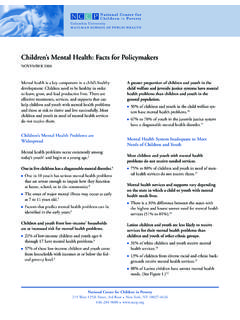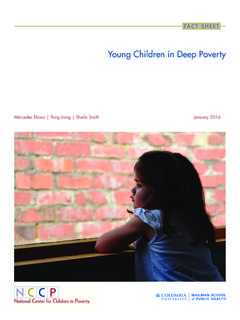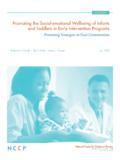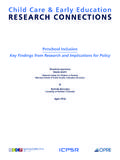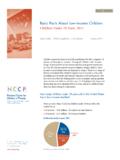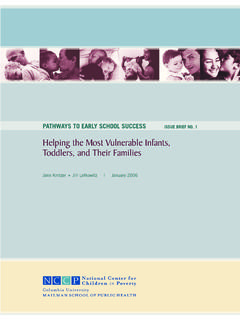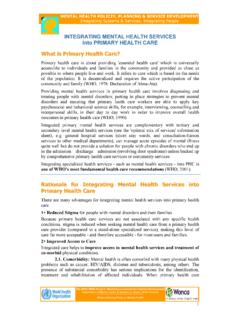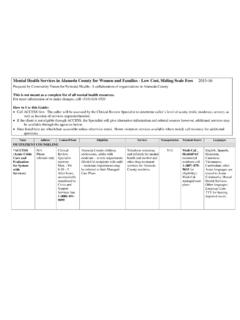Transcription of Using Medicaid to Help Young Children and Parents Access ...
1 REPORT | August 2016. Using Medicaid to help Young Children and Parents Access mental health services *. Results of a 50-State Survey *Updated March 2017. Sheila Smith | Maribel Granja | Mercedes Ekono | Taylor Robbins | Mahathi Nagarur The National Center for Children in Poverty (NCCP) is a non-partisan public policy research center at Columbia University's Mailman School of Public health . Founded in 1989 with endowments from the Carnegie Corporation of New York and the Ford Foundation, NCCP is dedicated to promoting the economic security, healthy development, and well- being of America's low-income Children and families. Using research to inform policy and practice, the center seeks to advance family-oriented solutions and the strategic use of public resources at the state and national levels to produce positive outcomes for the next generation. Using Medicaid to help Young Children and Parents Access mental health services : Results of a 50-State Survey Acknowledgments The authors are very grateful for the many Medicaid administrators who generously gave their time to participate in the survey and respond to follow-up questions.
2 The authors also wish to thank several individuals who provided valuable expert feedback on an early draft of the survey: Cindy Oser, Julie Cohen, Charles Bruner, Lisa Honigfeld, Catherine Wright, Olivia Golden, Dr. Bill Beardslee, Celeste Putnam, and Sally Nadols. A special thanks to the Alliance for Early Success for supporting the 50-state ECMH Medicaid survey and report. Suggested Citation Smith, S., Granja, M., Ekono, M., Robbins, T., Nagarur, M. (2016). Using Medicaid to help Young Children and Parents Access mental services : Results of a 50-State Survey New York: National Center for Children in Poverty, Mailman School of Public health , Columbia University. Copyright 2016 by the National Center for Children in Poverty National Center for Children in Poverty Introduction 2. Screening with a Tool Designed to Identify Young Children Who May Need Further Evaluation for Social-Emotional and Behavioral Difficulties 4.
3 Screening for Maternal Depression During Visits to a Pediatrician or Family Medicine Provider with Coverage Under the Child's Medicaid 7. services Provided by a mental health Clinician to Address a Child's mental health Needs in a Pediatric or Family Medicine Setting 10. services Provided by an Early Childhood mental health Specialist to Address a Child's mental health Needs in Child Care and Early Education Programs 13. services Provided by a mental health Clinician in the Home Setting to Address a Young Child's mental health Needs 15. Dyadic (Parent-Child) Treatment 17. Parenting Programs Designed to help Parents of Young Children Promote Children 's Social-Emotional Development and Address Child mental health Needs 19. Behavioral health Case Management/Care Coordination for a Young Child (0-6 Years) 21. Summary 24. Recommendations 25. References 26. Using Medicaid to help Young Children and Parents Access mental health services 1.
4 Introduction An increasing number of states are investing administrators, and leaders in early childhood in the well-being and success of Young Children and philanthropy, examine options for improving by expanding mental health services in pediatric, Medicaid coverage of ECMH services and the home, and community settings. These efforts quality of covered services . reflect substantial evidence about the central role that Young Children 's mental health plays The following sections present background in their early learning and school readiness, information and survey results: long-term school success and self-sufficiency, and future health and mental health Rationale for Medicaid Coverage of Key As states work to strengthen supports for Young ECMH services Children 's mental health , often with the goal Survey Methods of reducing the incidence of costly conditions Survey Results at later ages, they face the question of how to Recommendations finance new or expanded services .
5 Medicaid as a Key Source This brief examines states' use of Medicaid of Funding for ECMH services as a key source of funding for early childhood Under Medicaid 's Early and Periodic, Screening, mental health (ECMH) services . It presents the Diagnostic, and Treatment (EPSDT) benefit, results of a 50-state survey that gathered infor- health care providers are required to offer mation from state administrators about Medicaid periodic developmental and behavioral health coverage of the following services for Children screenings, diagnostic assessments for Children from birth to age 6: with positive screens, and treatment for identi- fied All medically necessary services Child screening for social-emotional problems must be covered, regardless of whether they are Maternal depression screening in pediatric included in the state Medicaid plan. The Centers and family medicine settings for Medicare and Medicaid services (CMS).
6 mental health services in a pediatric or family recommends the use of child screening resources medicine setting from Birth to Five: Watch Me Thrive!, an initiative mental health services in child care and early of the Departments of Education and health education settings and Human services that includes a detailed mental health services in the home setting guide to help pediatric health care providers Dyadic (parent-child) treatment establish regular behavioral health screening Parenting programs to address child mental in their health needs Case management/care coordination Recent CMS guidance that highlights the prev- alence of maternal depression and its harmful In addition to asking about whether states cover effects on Young Children informs states that each type of service, the survey also collected they may allow pediatric health care providers to information about policies related to coverage. bill for maternal depression screening under the These included requirements that providers use child's Medicaid during well-child This evidence-based screening tools or treatment guidance also tells states that Medicaid can cover models, service eligibility criteria, and rules about treatment related to maternal depression under the frequency or amount of service allowed.
7 The the child's Medicaid if the child is present and results of the survey can help stakeholders from a if the treatment directly benefits the child. An variety of sectors, including advocates, Medicaid example of this type of intervention is dyadic 2 National Center for Children in Poverty (parent-child) treatment, which is available in The survey asked participants about Medicaid several evidence-based payment, through fee-for-service and managed care, for key services : child screening for Overall, CMS rules and guidance convey strong social-emotional problems; maternal depression support for Medicaid coverage of key ECMH screening in pediatric settings; mental health services . The EPSDT screening requirements services in pediatric settings, early care and and provision that requires medically necessary education settings, and the home; dyadic services even when services are not included (parent-child) treatment; parenting programs.
8 In a state plan might suggest that states do not and behavioral health case management and need to consider the scope of covered child behav- care coordination. For each service, additional ioral health services in their state plan. However, questions were asked about specific policies EPSDT rules have fallen short of ensuring the related to service Access and quality. These delivery of needed prevention and treatment included questions about whether there are services to When health care providers limits on the amount of the Medicaid -covered must make the case for a service not covered service that can be provided; whether providers in a state plan, service delivery can be stalled, are required to use evidence-based screening and providers who do not know about the EPSDT or assessment tools, treatment models, and provision are not likely to offer services outside practices; specific services covered under broad of the state plan.
9 As the survey results will show, treatment categories; places where the service many states are including key ECMH services can be provided; and factors used to determine in their state Medicaid plans, moving toward eligibility for the service. Open-ended questions strong alignment with the goals of EPSDT while within sections about particular services reducing barriers to the delivery of mental health asked respondents to clarify or expand on services for Young Children . their responses, as needed. Survey Methods After the interview, NCCP research staff reviewed The Early Childhood mental health (ECMH) the surveys and made notes of any responses that Medicaid Survey was administered as a telephone seemed unclear or inconsistent. These were typi- interview to respondents. Interviewers were cally minor. States were then contacted again and National Center for Children in Poverty (NCCP) asked to review their survey responses for accuracy research staff and third-year law students in a and to respond to any questions resulting from the health policy course at Brooklyn Law School who NCCP staff review of responses.
10 Several reminder were trained to conduct the survey. Interviewers calls were made to key contacts in states until the contacted Medicaid directors in each state with a majority of states (44 states or 92 percent) provided standard description of the survey and an invi- confirmation of the accuracy of their responses. tation to participate or to designate an appropri- ate person in the Medicaid office to participate. Survey responses were analyzed to provide descrip- Through one or more communications by e-mail tive statistics about most responses. States selected and phone, an appropriate respondent was iden- for follow-up calls (Michigan, Minnesota, Oregon, tified in 48 states and the District of Columbia and the District of Columbia) provided additional who agreed to participate. Respondents included information about Medicaid -covered services , administrators from various offices within the supports for implementation, and selected policies states' Medicaid agencies, including EPSDT and by phone and through e-mail exchanges.

